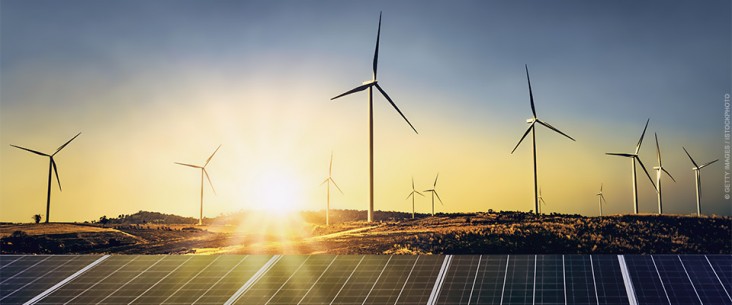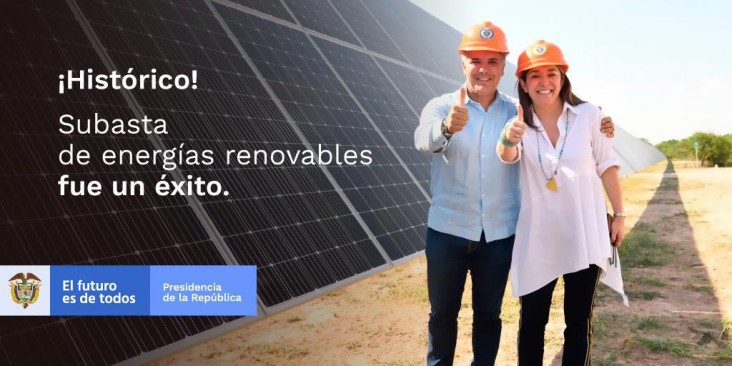- Energy Home
- How We Work
- Programs & Initiatives
- EmPOWERing Women and Girls
- Competitive Energy Procurement
- Toolkits
- Monitoring & Evaluation
- Resources
- Stories
Speeches Shim

Colombia joins its Latin American neighbors in utilizing renewable energy auctions to competitively procure electricity at record-low prices.
On October 22 and 23, 2019, the Government of Colombia announced the results of the country’s second renewable energy auction, a process supported by USAID through the Scaling Up Renewable Energy (SURE) project. The auction awarded contracts for nine projects that will provide 1,374 megawatts (MW) of new wind and solar power generation, at a historic-low average price for the country of approximately $28 per megawatt hour (MWh). USAID supported Colombia’s Ministry of Mines and Energy (MME) to tailor the auction to the country’s unique goals: Supply diversification for greater system resilience, reduced greenhouse gas emissions, lower costs, and improved energy security.
USAID informed the design of an auction IT platform and developed a bilingual document library to house key auction resources such as rules for bidder participation and the contracts to be awarded to winning bidders. Throughout the auction process, USAID monitored trends and innovations in global renewable energy auctions, and conducted study tours and workshops to help participants benefit from best practices.
USAID also coordinated with Bloomberg New Energy Finance to host events in Bogota and New York City to attract U.S. private sector developers to bid in the auction. Approximately 150 companies participated in the events, signaling strong private sector interest in the Colombian energy sector.
“The success of the renewable energy auction is also the fruit of the valuable cooperation and technical assistance that we received from cooperation agencies and multilateral banks, thank you USAID, IDB, World Bank and UK in Colombia and everyone who supported this transformation”
María Fernanda Suárez, Minister of Mines and Energy
Colombia’s First Renewable Energy Auction
Colombia conducted its first renewable energy auction on February 26, 2019. However, due to antitrust requirements set to ensure sufficient competition, the auction resulted in no awards.
This experience is not uncommon: In Chile, India, Poland, and Turkey, early renewable energy auction setbacks were followed by awards of historically low prices.
Colombia’s Second Renewable Energy Auction
USAID interviewed companies that participated in the first auction, including all 12 selected buyers and sellers, to determine options for a way forward. USAID’s assessment informed new rules for a second auction to be conducted in October 2019.
Between September 2018 and September 2019, USAID co-hosted 13 events with MME that convened 1,200 participants, including 544 people from 13 countries via live stream, and 22 distributors and retailers (the buyers). Fifty-three companies applied to participate: 27 sellers (generators) and 26 buyers (representing about 95 percent of Colombia’s regulated demand in 2018).
On October 22 and 23, MME announced the results of Colombia’s second renewable energy auction. Informed by a series of workshops and private sector engagement events led by USAID, energy developers submitted bids for 15-year energy delivery contracts that would deliver more reliable power to local communities.
Implementation of lessons learned from the first auction resulted in the award of contracts for nine projects that will provide 1,374 megawatts (MW) from wind (1,077 MW) and solar (297 MW) sources. Colombia’s competitive procurement process helped achieve historic-low average prices of approximately $28 per megawatt hour (MWh). This average price compares favorably with Mexico’s third round of renewable energy auctions, held in 2017, which netted an average price of $20.57/MWh. Moreover, Colombia’s 22 awarded buyers will buy power at less than 70 percent of current bilateral contract prices.
The seven awarded clean energy sellers will mobilize an estimated $1.3 billion in investment in Colombia’s energy sector. Combined with a February 2019 reliability auction, through which MME awarded 826 MW, the results of the October renewable energy auction will boost Colombia’s generation capacity by 2,250 MW, and will leverage more than $2 billion of estimated private sector investment.
Colombia’s enhanced capacity to provide reliable electricity supplies to its communities will drive economic growth, reduce costs to consumers, and move the country further on its goal to resiliency and path to self-reliance.


Comment
Make a general inquiry or suggest an improvement.